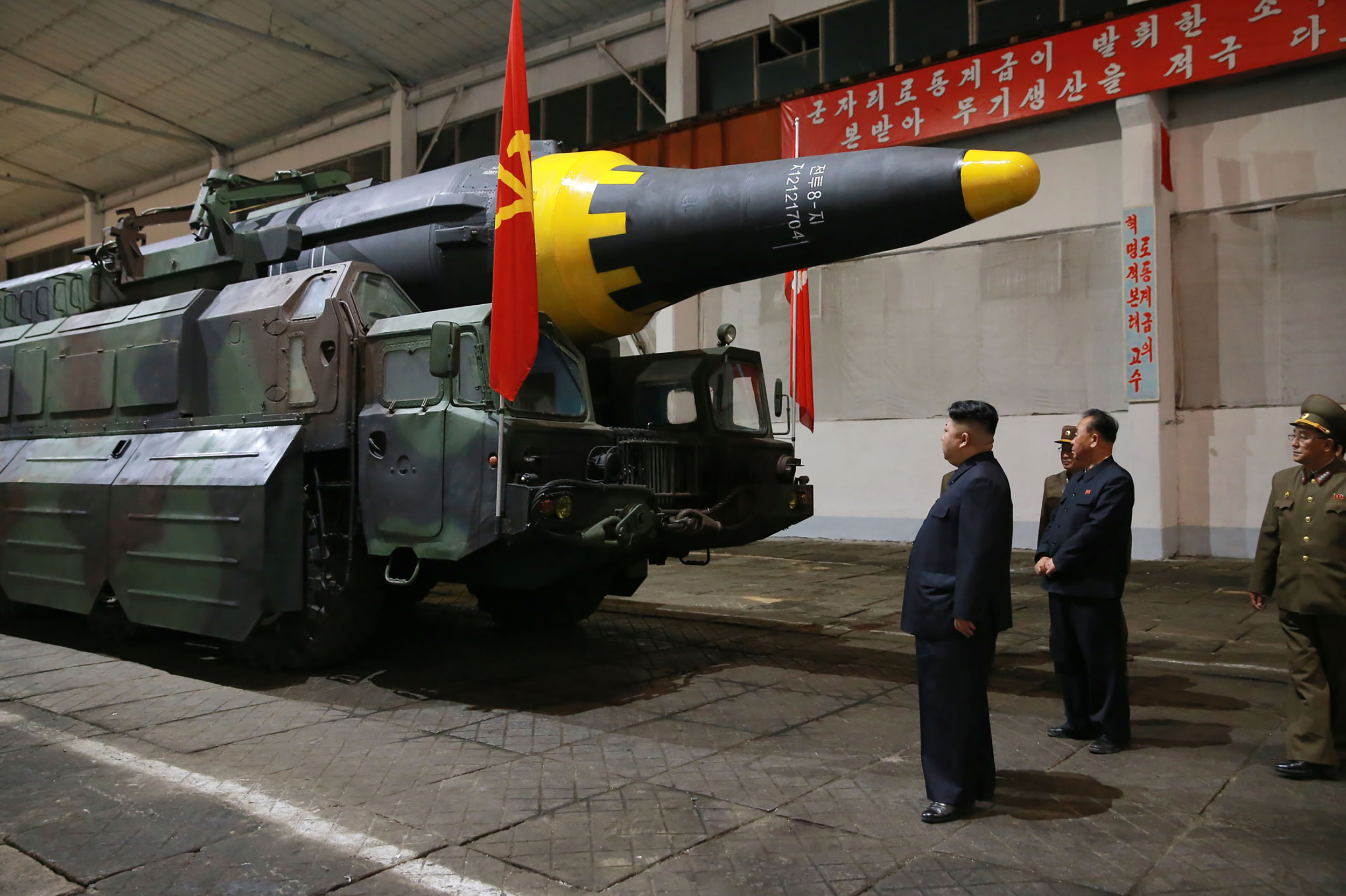6 ways North Korea will lash out against America
From more missile testing to a de facto alliance with Russia ...


A free daily email with the biggest news stories of the day – and the best features from TheWeek.com
You are now subscribed
Your newsletter sign-up was successful
North Korea may have finally faded from wall-to-wall cable coverage, but Kim Jong Un isn't ready to give up the spotlight. Friday night's test of an advanced multiple rocket launch system, which could cause major headaches for Seoul and Washington, show as much.
You see, North Korea is getting boxed in on all sides thanks to its recent missile tests, which have reportedly confirmed that it can now hit the U.S. homeland with a nuclear weapon. In response to this provocation, the Trump administration pushed through a tough set of UN Security Council-based sanctions, which, if enforced, could do real damage to Pyongyang's ability to gather the resources it needs to develop the next generation of nuclear weapons and the missiles to carry them. With unilateral sanctions also being imposed on Chinese and Russian firms, North Korea is finally feeling the heat.
But such tough actions will be met with a tough response. Kim Jong Un will push back — and I'm not just talking about a few rockets. The questions we need to be asking is when will he push back and how?
The Week
Escape your echo chamber. Get the facts behind the news, plus analysis from multiple perspectives.

Sign up for The Week's Free Newsletters
From our morning news briefing to a weekly Good News Newsletter, get the best of The Week delivered directly to your inbox.
From our morning news briefing to a weekly Good News Newsletter, get the best of The Week delivered directly to your inbox.
There are six obvious responses, all of which seem very plausible and likely to happen within the next several days to months. Some could come as a direct response to recent sanctions, but others will occur for the simple reason that they further North Korea's perceived national interests.
I do want to emphasize one point — the actions below will happen. It's just a question of when. And with that ...
1. More land-based missile testing
This is inevitable. To develop a viable and reliable nuclear weapons deterrent, you need missiles to carry your atomic arms to a target. And while nations like Russia, China, and the U.S. take such weapons for granted thanks to decades of development, North Korea is just starting to hit its stride. Look for Pyongyang in the months and years to come to test all types of short-, medium-, and long-range weapons. But every instance will only push tensions up a little further; one misfire could even set Asia on the path to war if it crash lands in South Korea or Japan.
A free daily email with the biggest news stories of the day – and the best features from TheWeek.com
2. Another nuclear weapons test
This is also inevitable. North Korea has already tested five nuclear devices starting in 2006. The next milestone Pyongyang will want to hit is a test of a hydrogen bomb, which Pentagon sources told me recently could be in North Korea's arsenal in as little as six months. When it does, watch the world go into panic once again, as Kim would then have the ultimate weapon that could destroy entire cities and, indeed, countries, if it can make enough of them.
3. More testing of submarine-based missiles
North Korea is working on another technology that America's military and other great powers take for granted: the ability to launch nukes from a conventionally powered submarine. Kim's goal over the long term would be to have multiple stealthy submarines that can hide in the open ocean and be ready to counterattack if Washington were to ever preemptively fire a nuke. At the moment, North Korea only has a testing sub — and it's quite old. It will likely take many years — if not decades — to get this technology right. So we can look forward to many tests, and lots more tension, to come.
4. Selling its weapons technology abroad
To be fair, Pyongyang already has been caught countless times selling its weapons and nuclear technology to some of the world's nastiest dictators — and thereby fueling some of the most violent conflicts on Earth today. But if China and Russia do hold true to their word and enforce sanctions, there is a real possibility that Kim may feel no choice but to expand his arms sales to additional points on the globe — and expand what he sells. One possibility: North Korea could easily expand its contacts with Iran, selling them their latest ICBM designs along with nuclear weapons research. Because we can't forget, no matter what you think about the Iran nuclear deal, it does expire in roughly 10 years ...
5. Some sort of unexpected military or cyber attack
Whether it's sinking South Korean naval vessels, shelling the DMZ, hacking American movie studios, or even trying to kill South Korea's president, North Korea knows how to escalate tensions — and fast. Kim will at some point test the will of the international community in the coming months through either a kinetic or cyber strike. Their preferred method of attack will likely be asymmetric — a.k.a. something difficult to respond to.
6. Make new allies — like Russia
Okay, so Moscow is not a new friend per say, but ties between Kim and Putin could really start to blossom, maybe into something like a de facto alliance. Russia clearly would love to cause America some pain thanks to its own sanctions problem with Washington and differences over Syria and Ukraine. It seems both Moscow and Pyongyang would have a lot to gain from a mutually beneficial partnership. For example, one way Moscow could really stick it to Washington would be to sell Pyongyang some of its advanced air-defense systems, like the S-400. Such platforms could help nullify America's advantage in the air, especially if President Trump were to ever order a strike on Kim's nuclear weapons program.
My advice for anyone who does anything involving foreign policy or national security: Enjoy these last few days of summer. Because the North Korea crisis is far from over.
Harry J. Kazianis is director of defense studies at the Center for the National Interest, founded by former U.S. President Richard M. Nixon.
-
 The 8 best TV shows of the 1960s
The 8 best TV shows of the 1960sThe standout shows of this decade take viewers from outer space to the Wild West
-
 Microdramas are booming
Microdramas are boomingUnder the radar Scroll to watch a whole movie
-
 The Olympic timekeepers keeping the Games on track
The Olympic timekeepers keeping the Games on trackUnder the Radar Swiss watchmaking giant Omega has been at the finish line of every Olympic Games for nearly 100 years
-
 Epstein files topple law CEO, roil UK government
Epstein files topple law CEO, roil UK governmentSpeed Read Peter Mandelson, Britain’s former ambassador to the US, is caught up in the scandal
-
 Iran and US prepare to meet after skirmishes
Iran and US prepare to meet after skirmishesSpeed Read The incident comes amid heightened tensions in the Middle East
-
 Israel retrieves final hostage’s body from Gaza
Israel retrieves final hostage’s body from GazaSpeed Read The 24-year-old police officer was killed during the initial Hamas attack
-
 China’s Xi targets top general in growing purge
China’s Xi targets top general in growing purgeSpeed Read Zhang Youxia is being investigated over ‘grave violations’ of the law
-
 Panama and Canada are negotiating over a crucial copper mine
Panama and Canada are negotiating over a crucial copper mineIn the Spotlight Panama is set to make a final decision on the mine this summer
-
 Why Greenland’s natural resources are nearly impossible to mine
Why Greenland’s natural resources are nearly impossible to mineThe Explainer The country’s natural landscape makes the task extremely difficult
-
 Iran cuts internet as protests escalate
Iran cuts internet as protests escalateSpeed Reada Government buildings across the country have been set on fire
-
 US nabs ‘shadow’ tanker claimed by Russia
US nabs ‘shadow’ tanker claimed by RussiaSpeed Read The ship was one of two vessels seized by the US military
